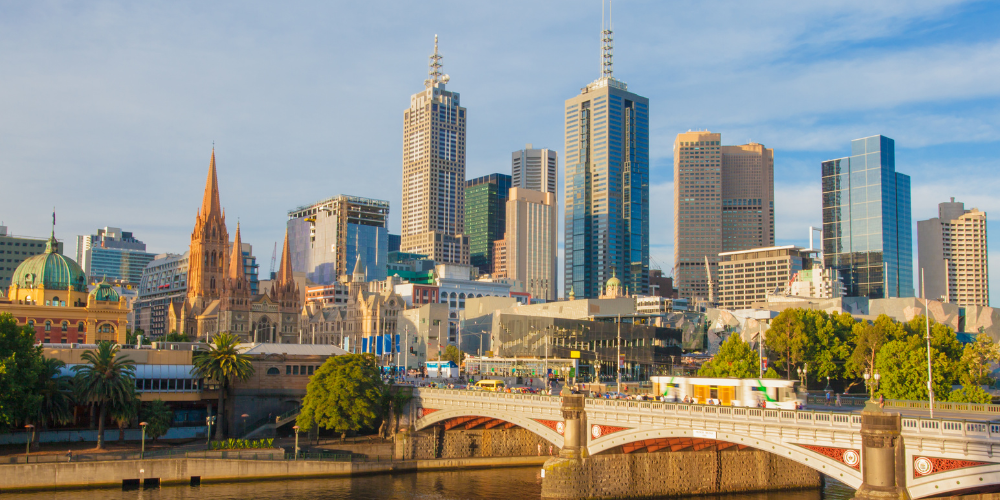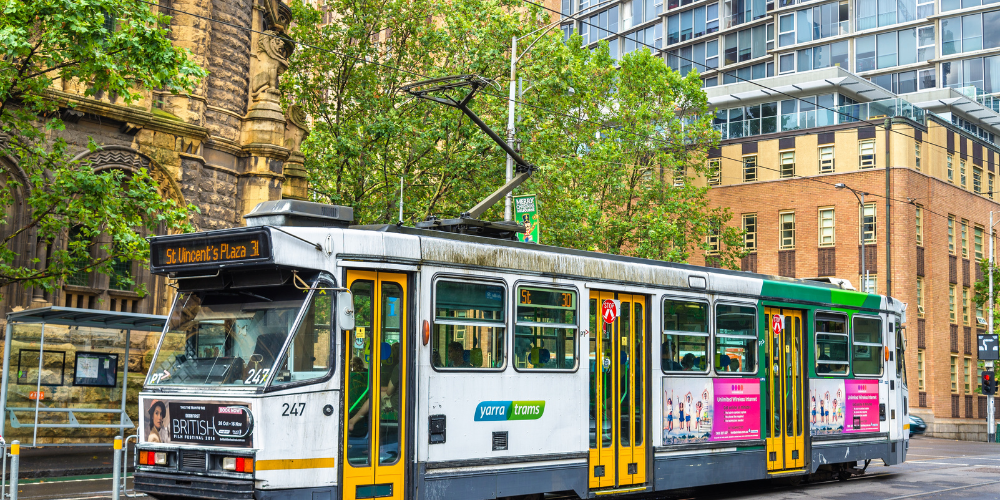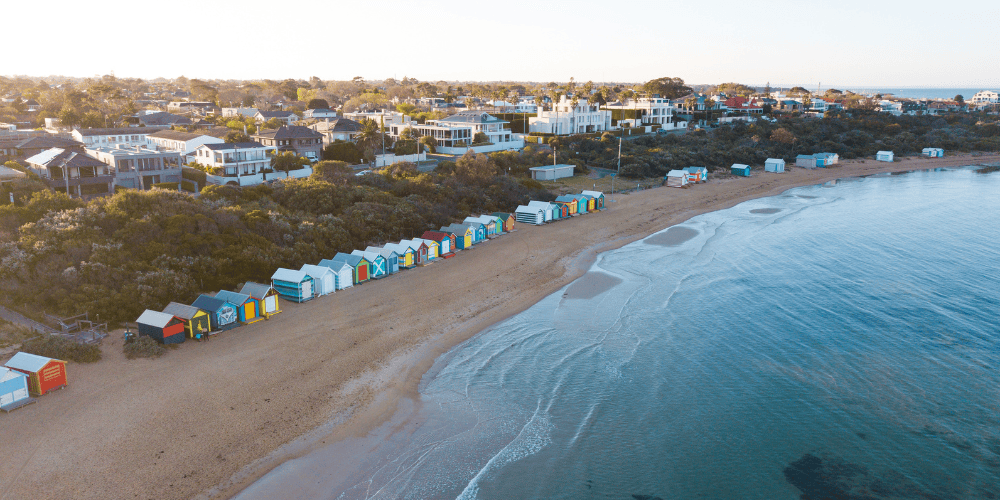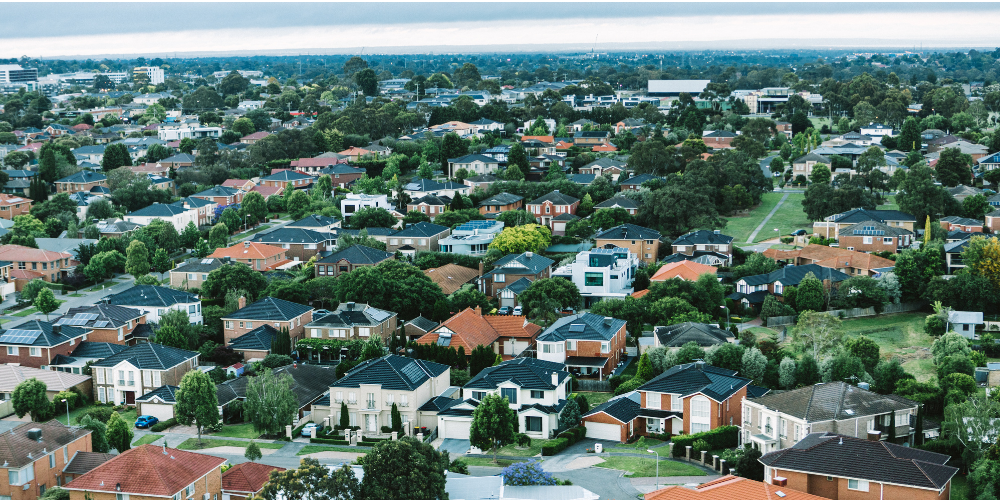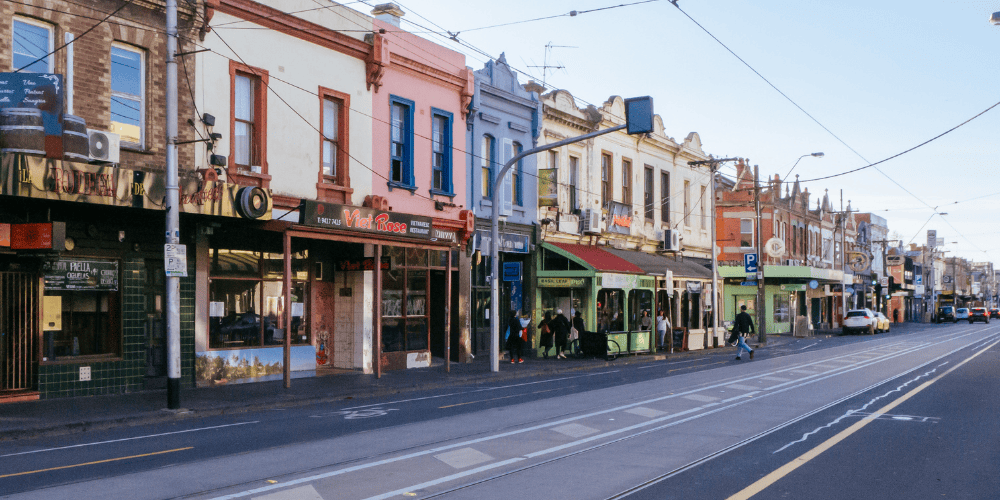There’s no two ways about it, Melbourne is a city on the rise.
Recently dethroning Sydney as the most populous city in Australia, Melbourne is one of the most exciting and hotly contested property markets in Australia.
Consistently ranked as one of the world’s most liveable cities and boasting an unmatched arts, culture, and food scene, it should come as no surprise that Melbourne’s property prices have been steadily rising over the last decade. So when it comes to buying in Melbourne, finding high-growth suburbs that are going to yield a positive return in the long-run can be tough to navigate.
Melbourne is a city that is steeping in history and provides a myriad of opportunities for a diverse range of real estate investors. Whether you’re just dipping your toe into the property market, or you’re a seasoned property mogul ready to expand your portfolio, it’s essential to understand the market landscape to make the right investments.
So, let’s dive into the nitty gritty details of Melbourne’s high-growth suburb so that you can make an informed investment decision. Here is our subjective, buyers-guide-led list of Melbourne’s best investment suburbs for 2023.
Criteria for Determining Melbourne’s Best Investment Suburbs
Navigating Melbourne’s property market is no easy feat. Understanding what to look for and areas with high-growth potential can be a challenge. So, to narrow the scope and focus our sights on what really matters, we’ve put together a list of our criteria points for determining Melbourne’s best investment suburbs.
Population Growth
Areas with strong popular growth offer strong investment potential for those looking to make their mark in the property market. Population growth is synonymous with increased demand for housing and, naturally, an increase in property prices. A consideration for our choices for top investment suburbs in Melbourne for 2023 has been suburbs that are in the midst of population growth.
Job Growth
Growing job opportunities means a growing population. In recent times, this criteria point has become less important (although far from moot) as more workers shift towards hybrid or entirely remote working set-ups. Suburbs with a strong job growth may result in higher rental demand and property values – two important points to consider for real estate investors.
Infrastructure
Planned or existing infrastructure plays an important role in determining the upward growth opportunity for your property investment portfolio. In this list, we consider good transport links, schools, hospitals, and other essential services. Remember, new infrastructure pro jects like train lines or highways can boost property values as areas become more accessible.
Location
You’ve heard it once and you’ll hear it a million more times, location is essential when it comes to investing in property. Areas with proximity to key areas such as the city centre, beaches, or major employment hubs can influence its investment potential for investors.
Amenities
Shops, schools, restaurants, cafes, and those little things that make life easier are an essential consideration when it comes to investing in property in Melbourne in 2023. Suburbs with quality amenities can attract a broad range of potential tenants and buyers which, in turn, can increase property values.
Liveability
Liveability is an intangible factor that is thrown around in those listicles that you see on social media or in selected news reports. But, as subjective as it may seem, liveability plays a big role for investors. Factors like local schools, cleanliness, and the sense of community all play an important role in determining the liveability score of an area.
Growth Potential
A look at historic house prices and all of the above factors plays an important role in determining the growth potential of any real estate investment. Suburbs with a strong track record for growth, are in the midst of new developments or have improvements in the works offer strong investment opportunity and future price appreciation opportunities.
Our Choice for Melbourne’s Best Investment Suburbs for 2023
Bentleigh & Bentleigh East, 3204 & 3165
Both nestled in the City of Glen Eira local government area and situated 13- and 14-kilometres south-east of Melbourne's central business district, Bentleigh & Bentleigh East are two areas to watch for investment in 2023. Bentleigh & Bentleigh East provide a mix of residential and commercial property investment opportunities with excellent public transport links thanks to the Frankston railway line and stations in both suburbs.
Distance to CBD: Bentleigh is 13 km and East Bentleigh is 14 km away.
Local Schools: Bentleigh Grammar School, Bentleigh Girls Grammar School, Caulfield North Secondary College, East Bentleigh Primary School, and East Bentleigh Secondary College.
Notable Local Amenities: Bentleigh Market, Bentleigh Library, Bentleigh Town Hall, East Bentleigh Market, East Bentleigh Library, East Bentleigh Town Hall.
Population (combined): 48,561
Median Age: 39
Number of Families (combined): 13,581
Number of Dwellings (combined): 19,530
Median Household Income (combined median): $2,229
Average House Price May 2023 (combined median): $1,551,250
Box Hill, 3128
Renowned for an eclectic population and strong Asian influence, Box Hill provides an idyllic melting pot of food, culture, and amenities that makes it a suburb with strong growth and investment potential in 2023. Renowned for significant commercial and transport hub and a bustling shopping district that includes the expansive Box Hill Central shopping centre, Box Hill is an attractive choice for families and students.
Distance to CBD: 16 km
Local Schools: Box Hill Senior Secondary College, Box Hill North Secondary College, Whitefriars College
Notable Local Amenities: Box Hill Central Shopping Centre, Box Hill Gardens, Box Hill Hospital, Box Hill Town Hall
Population: 14,353
Median Age: 33
Number of Families: 3,422
Number of Dwellings: 7,777
Median Household Income: $1,267
Average House Price May 2023: $1,445,000
Brighton, 3186
Widely regarded as one of the most prestigious suburbs in Australia, Brighton is renowned for its grand homes, upscale lifestyle, and iconic colourful beach boxes along the shoreline. Though not an easy housing market to crack into with an average house price north of $3-million, Brighton offers endless investment upside and long-term growth opportunity.
Distance to CBD: 11 km
Local Schools: Brighton Grammar School, Brighton Girls Grammar School, Haileybury College
Notable Local Amenities: Brighton Beach, Dendy Street Bathing Boxes, Brighton Market, Brighton Library
Population: 23,252
Median Age: 48
Number of Families: 6,406
Number of Dwellings: 10,536
Median Household Income: $2,710
Average House Price May 2023: $3,200,000
Carlton, 3053
An inner-city Melbourne suburb with a rich history and culture, known for its vibrant nightlife, its many cafes, and restaurants, Carlton (or little Italy) is considered by many to be a hub unto-itself. With excellent transport links and just 3km to Melbourne’s CBD, Carlton is an attractive hub for young professionals and students alike.
Distance to CBD: 3 km
Local Schools: Melbourne High School
Notable Local Amenities: Carlton Gardens, Royal Exhibition Building, Melbourne Museum, Lygon Street, Carlton Market, Princess Theatre, Royal Botanic Gardens.
Population: 16,055
Median Age: 27
Number of Families: 2,533
Number of Dwellings: 10,344
Median Household Income: $1,292
Average House Price May 2023: $1,500,000
Caroline Springs, 3023
Established in 1999 within an area of just 4.9 km2, Caroline Springs is a young suburb that provides excellent amenities, parks, and sporting facilities that has made it a popular choice for families and young professionals.
Distance to CBD: 26 km
Local Schools: Caroline Springs Secondary College, Caroline Springs North Secondary College
Notable Local Amenities: Caroline Springs Town Centre, Caroline Springs Lake, Caroline Springs Leisure Centre
Population: 20,365
Median Age: 35
Number of Families: 5,415
Number of Dwellings: 6,851
Median Household Income: $2,133
Average House Price May 2023: $740,000
Caulfield, 3162
Caulfield is an upmarket suburb that provides a mix of residential and commercial investment opportunities. Lauded for its many schools, close proximity to the Melbourne CBD and, of course, its strong ties to the famous Caulfield Racecourse and Monash University's Caulfield campus, Caulfield is a popular choice for families and working professionals.
Distance to CBD: 10 km
Local Schools: Caulfield Grammar School, Caulfield Girls Grammar School, Caulfield North Secondary College
Notable Local Amenities: Caulfield Racecourse, Caulfield Park, Caulfield Junction Shopping Centre
Population: 5,748
Median Age: 42
Number of Families: 1,478
Number of Dwellings: 2,433
Median Household Income: $2,143
Average House Price May 2023: $1,940,000
Chelsea, 3196
Chelsea is a desirable coastal suburb that offers a relaxed atmosphere and beautiful beaches and green spaces without scarifying proximity to the Melbourne CBD. Chelsea is a popular choice for families that are looking to make the most of the weekends and retirees ready to embrace everything that Melbourne’s unique coastline has to offer.
Distance to CBD: 18 km
Local Schools: Chelsea Primary School, Chelsea High School
Notable Local Amenities: Chelsea Beach, Ricketts Point, The Esplanade
Population: 8,347
Median Age: 41
Number of Families: 2,214
Number of Dwellings: 4,047
Median Household Income: $1,683
Average House Price May 2023: $1,020,000
Craigieburn, 3064
Craigieburn is an outer Melbourne suburb that forms a strong part of Melbourne’s growing northern suburbs region. A multi-cultural hub that provides families with access to schools, green spaces, and shopping facilities, Craigieburn is a high-growth suburb that has become a popular choice for savvy investors over the last decade.
Distance to CBD: 32 km
Local Schools: Craigieburn Secondary College, Craigieburn North Secondary College
Notable Local Amenities: Craigieburn Town Centre, Craigieburn Central Park, Craigieburn Marketplace
Population: 65,178
Median Age: 32
Number of Families: 16,781
Number of Dwellings: 20,732
Median Household Income: $1,798
Average House Price May 2023: $630,000
Croydon, 3136
Nestled in the foothills of the Dandenong Ranges,Croydon is an expansive suburb with a mix of residential and commercial areas, known for its large shopping centre, Westfield Croydon, and its many schools. A safe bet for smart investors, Croydon combines proximity with liveability for families, students, and young working professionals.
Distance to CBD: 20 km
Local Schools: Whitefriars College, Croydon North Secondary College, Croydon High School
Notable Local Amenities: Westfield Shopping Centre, Croydon Park, Croydon Library
Population: 28,608
Median Age: 39
Number of Families: 7,785
Number of Dwellings: 12,435
Median Household Income: $1,6154
Average House Price May 2023: $872,000
Elsternwick, 3185
Elsternwick is an upmarket beachfront suburb with a high $2.2-million average house price as of early 2023. Renowned for its beautiful homes, its many schools, and its proximity to the Melbourne CBD, Elsternwick is a tough market to crack but for those that can afford the opportunity, the suburb offers extremely strong long-term growth potential.
Distance to CBD: 12 km
Local Schools: Elsternwick Girls Grammar School, Elsternwick Primary School
Notable Local Amenities: Elsternwick Beach, Elsternwick Park, Elsternwick Market
Population: 10,887
Median Age: 38
Number of Families: 2,800
Number of Dwellings: 5,250
Median Household Income: $2,209
Average House Price May 2023: $2,220,000
Epping, 3076
Epping is a major commercial and educational centre situated just 22km from Melbourne’s CBD. With an echelon of green spaces, shopping centres, and amenities on its doorstep, Epping has undergone significant growth and development over the last decade that has placed it squarely in the investment-firing-line of new investors, families, and young professionals alike.
Distance to CBD: 22 km
Local Schools: Epping Boys Grammar School, Epping Girls Grammar School, Epping North Secondary College
Notable Local Amenities: Epping Plaza, Epping Gardens, Epping Hospital
Population: 33,489
Median Age: 35
Number of Families: 8,779
Number of Dwellings: 11,923
Median Household Income: $1,671
Average House Price May 2023: $656,000
Glenroy, 3046
Glenroy is a family-friendly suburb that offers a quiet, suburban lifestyle with easy access to Melbourne’s CBD. Known for its many cafes and restaurants, Glenroy offers an array of cafes and restaurants that have made it a popular choice for families, young professionals, and students in recent years.
Distance to CBD: 12 km
Local Schools: Glenroy Secondary College, Glenroy North Secondary College
Notable Local Amenities: Glenroy Market, Glenroy Park, Glenroy Library
Population: 23,792
Median Age: 34
Number of Families: 5,966
Number of Dwellings: 10,053
Median Household Income: $1,655
Average House Price May 2023: $800,000
Hoppers Crossing, 3029
Hoppers Crossing is an outer suburb of Melbourne located 27km from the CBD and renowned for its growing population, education opportunities, and amenities. Hoppers Crossing boasts numerous schools, shopping centres and easy access to the CBD thanks to excellent public transport links.
Distance to CBD: 27 km
Local Schools: Hoppers Crossing Secondary College, Hoppers Crossing North Secondary College
Notable Local Amenities: Hoppers Crossing Town Centre, Hoppers Crossing Lake, Hoppers Crossing Leisure Centre
Population: 37,216
Median Age: 37
Number of Families: 9,988
Number of Dwellings: 13,970
Median Household Income: $1,580
Average House Price May 2023: $625,000
Melton, 3337
Melton is an outer Melbourne suburb situated 40km from the CBD and renowned for its large population, excellent shopping amenities, and recreational facilities. Melton is a high-growth suburb with a mix of urban and rural living that offers affordable housing opportunities for families and young professionals alike.
Distance to CBD: 40 km
Local Schools: Melton High School, Melton South Secondary College, Melton West Secondary College
Notable Local Amenities: Melton Central Shopping Centre, Melton Showgrounds, Melton Botanic Gardens
Population: 178,960
Median Age: 33
Number of Families: 46,567
Number of Dwellings: 60,338
Median Household Income: $1,887
Average House Price May 2023: $479,500
Sunbury, 3429
Sunbury is an outer Melbourne suburb with a growing population that is renowned for historic buildings and vineyards that offer both country charm and city convenience. A popular choice for young families and savvy investors that recognise the eclectic offerings of the area, Sunbury is a strong choice for families and young professionals that want a relaxed lifestyle without sacrificing CBD proximity.
Distance to CBD: 48 km
Local Schools: Sunbury High School, Sunbury Secondary College, Sunbury Girls Grammar School
Notable Local Amenities: Sunbury Town Centre, Sunbury Racecourse, Sunbury Lake
Population: 38,851
Median Age: 38
Number of Families: 10,948
Number of Dwellings: 15,311
Median Household Income: $1,925
Average House Price May 2023: $670,000

